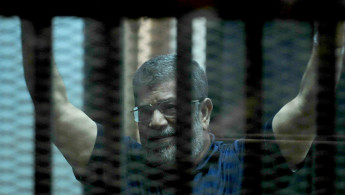Egypt regime lashes at UN following criticism of Mohamed Morsi's treatment
Egypt accused the United Nations on Wednesday of seeking to "politicise" the death in court of the country's first democratically elected president Mohamed Morsi by calling for an "independent inquiry".
Foreign ministry spokesman Ahmed Hafez said he condemned "in the strongest terms" the call by the spokesman for the UN High Commissioner for Human Rights, Rupert Colville, for an independent investigation into Morsi's death on Monday.
Hafez said it was a "deliberate attempt to politicise a case of natural death."
Blackout death
The Egyptian regime, which has been accused of murdering Morsi slowly over six years, has taken drastic measures to downplay his death.
Egyptian pro-regime media attempted to bury reports on his death, with most Egyptian dailies barely mentioning Mohamed Morsi's dramatic collapse and death inside a Cairo courtroom on Monday.
Most Egyptian state-owned dailies only carried brief reports on Morsi's death, buried in the back pages of Tuesday editions.
The tiny reports referred to him by his full name but not his position as former president.
Pro-regime news websites similarly ignored the news, while Arab and international media have provided extensive coverage to Morsi and the poor conditions Egyptian authorities held him in since he was ousted by military coup six-years-ago.
Even his funeral, which took place on Tuesday, was done under high security.
Morsi's lawyer mentioned that a few members of Morsi's family were allowed to attend funeral prayers in the mosque of Cairo's infamous Tora prison, followed by the burial at the government's cemetery that contains the graves of other leading Islamists in the city's Nasr City district.
Morsi's son, Ahmed, said authorities refused to allow Morsi to be buried at the family's cemetery in his hometown in Sharqia province in the Nile Delta.
The ousted president was buried next to former Muslim Brotherhood head Mohamed Akef, who died in prison in 2017, and another prominent Islamist leader.
Security agents turned reporters away from the cemetery and prevented them from taking photographs of the funeral. Reporters were also barred from travelling to Morsi's hometown.
Morsi, 67, was elected president in 2012 in the country's first free elections following the ouster of longtime autocrat Hosni Mubarak in 2011.
A military coup toppled Morsi in 2013 after massive protests. The military, led by then-defence minister Abdel Fattah al-Sisi, crushed the Brotherhood in a major crackdown and arrested Morsi and many of the group's leaders.
Rights groups accuse the Egyptian authorities of keeping Morsi in inhumane conditions in prison and refusing him treatment for diabetes.
The former president was held in solitary confinement for most of his six years in prison, which amounts to torture under international standards.
Follow us on Twitter: @The_NewArab





 Follow the Middle East's top stories in English at The New Arab on Google News
Follow the Middle East's top stories in English at The New Arab on Google News
![Israeli forces ordered bombed Gaza's Jabalia, ordering residents to leave [Getty]](/sites/default/files/styles/image_330x185/public/2176418030.jpeg?h=a5f2f23a&itok=_YGZaP1z)

